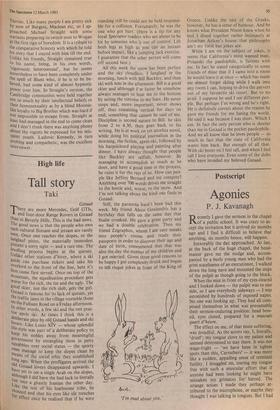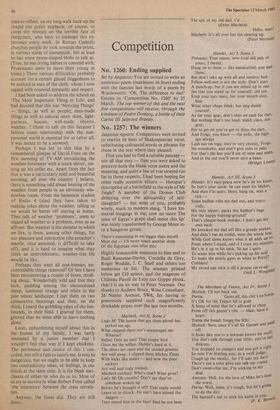Postscript
Agonies
P. J. Kavanagh
Recently I gave the sermon in the chapel of a public school. It was crazy to ac- cept the invitation but it arrived six months ago and I find it difficult to believe that anything, six months hence, will happen.
Inexorably the day approached. At last, at the back of the huge chapel, the head- master gave me the nudge and, accom- panied by a burly young man who had the grim statelinesss of an executioner, I walked down the long nave and mounted the steps of the pulpit as though going to the block.
When the mist in front of my eyes cleared and I looked down — the pulpit was to one side, so I saw everybody sideways — I was astonished by hundreds of exposed napes. No one was looking up.. They had all com- posed themselves in what was presumably their sermon-enduring position: head bow- ed, eyes closed, prepared for a mauvais quart d'heure.
The effect on me, of that mute suffering, was dreadful. As the actors say, I, literally, `dried': my tongue clove to my palate and seemed determined to stay there. It was not stage-fright — 'we have been in tighter spots than this, Carruthers' — it was more like a sudden, appalling sense of terminal futility. I struggled on, tearing my tongue free with such a muscular effort that if anyone had been looking he might have mistaken my grimaces for' hatred. The strange noises I made they perhaps at- tributed to the microphone, or maybe they thought I was talking in tongues. But I had time to reflect, on my long walk back up the chapel (no polite applause, of course, to cover my retreat) on the terrible fate of clergymen, who have to undergo this ex- perience every week. In Roman Catholic churches people do look towards the priest, in various states of inattention, but at least he has some moon-shaped blobs to talk at. (True, he has crying babies to contend with; Protestants seem to leave their young at home.) These various difficulties probably account for a certain glazed doggedness to be noticed in men of the cloth, whom I now regard with renewed sympathy and respect.
I had been asked to address the school on 'The Most Important Thing, in Life' and had decided that this was 'Noticing Things' — things, as well as people; man-made things as well as natural ones: skies, light- patterns, houses, well-made objects, weather. I chose to talk on this because I believe some relationship with the non- personal world is essential for us (after all, it was meant to be a sermon).
Perhaps I was led to this idea by a remembered glimpse of David Frost on the first morning of TV-AM introducing the weather-forecaster with a mock shiver, tur- ning up his collar etc. Apart from the fact that it was a particularly mild and beautiful morning, all over the country I believe, there is something odd about hearing of the weather from people in an obviously win- dowless room. From the basement studios of Radio 4 (alas) they have taken to making jokes about the weather, telling us we would be better off staying at home. They talk of weather 'problems', seem to regard all weather as a problem, even as an affront. But weather is the element in which we live, is there, among other things, for our pleasure and instruction (the preacher's mantle, once assumed, is difficult to take off), and it is hard to imagine what they think an unproblematic, weather-free life would be like.
Perhaps they want all non-human, un- controllable things removed? 'Of late I have been encountering a couple of foxes, stroll- ing about. Wonderfully wild and free they look, padding among the unconcerned sheep, luminous orange and white in the pale winter landscape. I met them on two consecutive mornings and then, on the third, I heard the gobbling yelps of the fox- hounds, in their field. I grieved for them, grieved that we seem able to leave nothing alone.
Later, unburdening myself about this in the bosom of my family, I was tartly reminded by a junior member that I wouldn't feel that way if I kept chickens. The pertinence and justice of this I con- ceded, but still it fails to satisfy me. It may be dangerous, but we ought to be able to keep two contradictory ideas, or feelings, in our minds at the same time. It is the bleak mer- chants of either/or who do us in. Most of us try to survive in what Robert Frost called 'the interstices' between the crass certain- ties.
Anyway, the foxes did. They are still there.











































 Previous page
Previous page